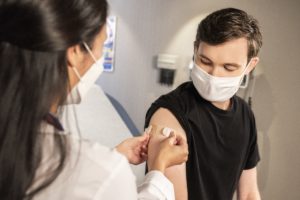The Joint Committee on Vaccination and Immunisation (JCVI) is advising that all 16 and 17-year olds receive their first dose of the Pfizer-BioNTech vaccine.
In the last few weeks, there have been large changes in the way Covid-19 has been spreading in the UK, particularly in younger age groups.
The JCVI said the adult vaccine programme has progressed very successfully and more safety data has become available, so it was important to review the advice for the vaccination of children and young people.
This updated advice means the committee can be confident that young people will be afforded around 80% protection against hospitalisation following receipt of their first dose.
It is expected that protection will probably be even higher as younger people respond better to vaccines and some will have already had the Covid-19 infection, meaning they will have an even better response to a first dose.
The JCVI says it has looked at the very latest safety data from the UK and other countries as we know that some serious side effects have been reported in this younger age group.
This includes myocarditis (inflammation of the heart muscle) and pericarditis (inflammation of the membrane around the heart). These are extremely rare and usually occur within a few days of the second dose, typically more in young men.
Data from the USA suggests that, in males aged 12 to 17 years, 9.8 cases of myocarditis were reported per million first doses given. This rises to 67 per million after the second dose. Most people recovered quickly.
The committee said it knows that Covid-19 is usually mild in younger people and so it is important to weigh up the benefits of any vaccine against the possible, although extremely rare, side effects.
In the UK where there is good uptake of the vaccine amongst adults, so a more precautionary approach to vaccine rollout can be taken in younger people, who are at lower risk of serious harm from Covid-19.

The JCVI said it is important to keep young people well and in school in the Autumn term and to minimise disruption to education as far as possible. For now we recommend prioritising the first dose in younger age groups.
It is likely that, when the second dose is offered, it will be from 12 weeks after the first dose. The benefit of having an eight- to 12-week gap between the first and second doses is becoming increasingly clear as it offers more protection for a longer period of time.
Professor Wei Shen Lim, Covid-19 Chair for JCVI, said: ‘After carefully considering the latest data, we advise that healthy 16- to 17-year-olds are offered a first dose of Pfizer-BioNTech vaccine. Advice on when to offer the second vaccine dose will come later.
‘While Covid-19 is typically mild or asymptomatic in most young people, it can be very unpleasant for some and for this particular age group, we expect one dose of the vaccine to provide good protection against severe illness and hospitalisation.’
Health and social care secretary, Sajid Javid said: ‘Today’s advice from the independent Joint Committee on Vaccination and Immunisation (JCVI) means more young people aged 16 and over can benefit from Covid-19 vaccines.
‘I have accepted their expert recommendations and I have asked the NHS to prepare to vaccinate those eligible as soon as possible.
‘The JCVI have not recommended vaccinating under-16s without underlying health conditions but will keep its position under review based on the latest data.
‘Those aged 12 to 15 with severe neuro-disabilities, Down’s Syndrome, immunosuppression and multiple or severe learning disabilities, as well as people in this age group who are household contacts of individuals who are immunosuppressed, are already eligible for vaccination.
‘JCVI will continue to review data and provide updates on at risk groups aged 12-15 and whether any additional groups will be added.
‘Covid-19 vaccines have saved more than 60,000 lives and prevented 22 million infections in England alone. They are building a wall of defence against the virus and are the best way to protect people from serious illness.
‘I encourage everyone who is eligible to come forward for both their jabs as quickly as possible.’
Photo Credit – CDC












